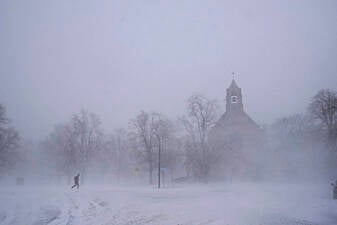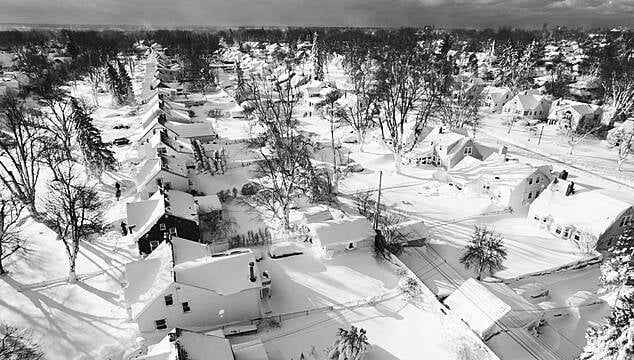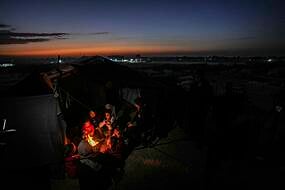The death toll from a pre-Christmas blizzard that paralysed the Buffalo area and much of the US has risen to 27 in western New York, authorities said, as the region dug out from one of the worst weather-related disasters in its history.
The dead have been found in their cars, homes and in snowbanks. Some died while shovelling snow.
The storm that walloped much of the US is now blamed for at least 48 deaths nationwide, with rescue and recovery efforts continuing on Monday.
The blizzard roared through western New York on Friday and Saturday, stranding motorists, knocking out power and preventing emergency crews from reaching residents in frigid homes and stuck cars.

Huge snowdrifts nearly covered cars on Monday and there were thousands of houses, some adorned in unlit holiday displays, that have been dark from a lack of power.
The massive storm is expected to claim more lives because it trapped some residents inside houses and knocked out power to tens of thousands of homes and businesses.
Extreme weather stretched from the Great Lakes near Canada to the Rio Grande along the border with Mexico.
About 60% of the US population faced some sort of winter weather advisory or warning, and temperatures plummeted drastically below normal from east of the Rocky Mountains to the Appalachians.
The National Weather Service said on Sunday the frigid arctic air “enveloping much of the eastern half of the US” will move away slowly.
Buffalo saw hurricane-force winds and snow causing whiteout conditions that paralysed emergency response efforts.
New York governor Kathy Hochul said almost every fire engine in the city was stranded on Saturday and she implored people on Sunday to respect an ongoing driving ban in the region.
The National Weather Service said the snow total at the Buffalo Niagara International Airport stood at 43in (1.1 metres) at 7am on Sunday. Officials said the airport would be shut until Tuesday morning.

With snow swirling down untouched and impassable streets, forecasters warned an additional 1ft to 2ft (30 to 60 centimetres) of snow was possible in some areas through early Monday morning amid wind gusts of 40mph.
Police said on Sunday evening that there were two “isolated” instances of looting during the storm.
Two people died in their suburban Cheektowaga, New York, homes on Friday when emergency crews could not reach them in time to treat their medical conditions.
Erie County executive Mark Poloncarz said 10 more people died there during the storm, including six in Buffalo, and warned there may be more dead.
“Some were found in cars, some were found on the street in snowbanks,” Mr Poloncarz said. “We know there are people who have been stuck in cars for more than two days.”
Freezing conditions and power outages had Buffalonians scrambling to get to anywhere with heat amid what Ms Hochul called the longest sustained blizzard conditions ever in the city.
Ditjak Ilunga, of Gaithersburg, Maryland, was on his way to visit relatives in Hamilton, Ontario, for Christmas with his daughters on Friday when their SUV was trapped in Buffalo.
Unable to get help, they spent hours with the engine running, buffeted by wind and nearly buried in snow.

By 4am on Saturday, their fuel nearly gone, Mr Ilunga made a desperate choice to risk the howling storm to reach a nearby shelter.
He carried six-year-old Destiny on his back while 16-year-old Cindy clutched their Pomeranian puppy, following his footprints through drifts.
“If I stay in this car I’m going to die here with my kids,” Mr Ilunga recalled thinking.
He cried when the family walked through the shelter doors.
“It’s something I will never forget in my life.”
Travellers’ weather woes continued, with hundreds of flight cancellations already and more expected after a bomb cyclone – when atmospheric pressure drops very quickly in a strong storm – developed near the Great Lakes, stirring up blizzard conditions, including heavy winds and snow.

The storm knocked out power in communities from Maine to Seattle. According to poweroutage.us, fewer than 100,000 customers were without power on Monday at 7am EDT – down from a peak of 1.7 million.
Storm-related deaths were reported all over the country, from six motorists killed in crashes in Missouri, Kansas and Kentucky to a woman who fell through Wisconsin river ice.
In Jackson, Mississippi, city officials on Christmas Day announced residents must now boil their drinking water due to water lines bursting in the frigid temperatures.







